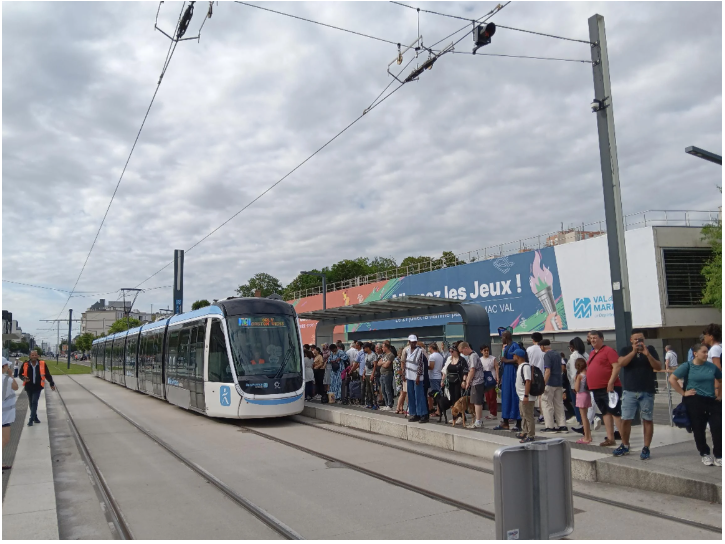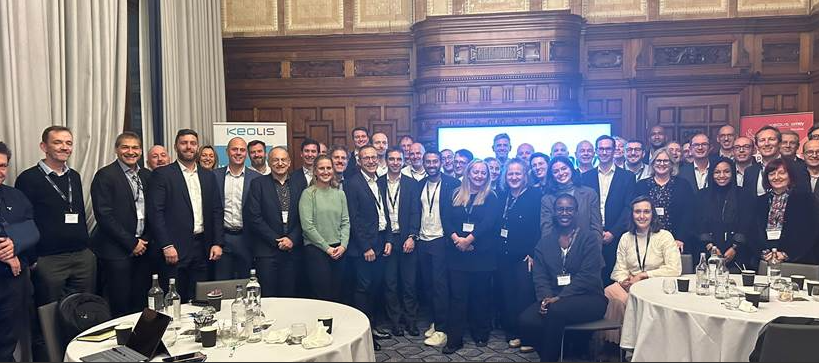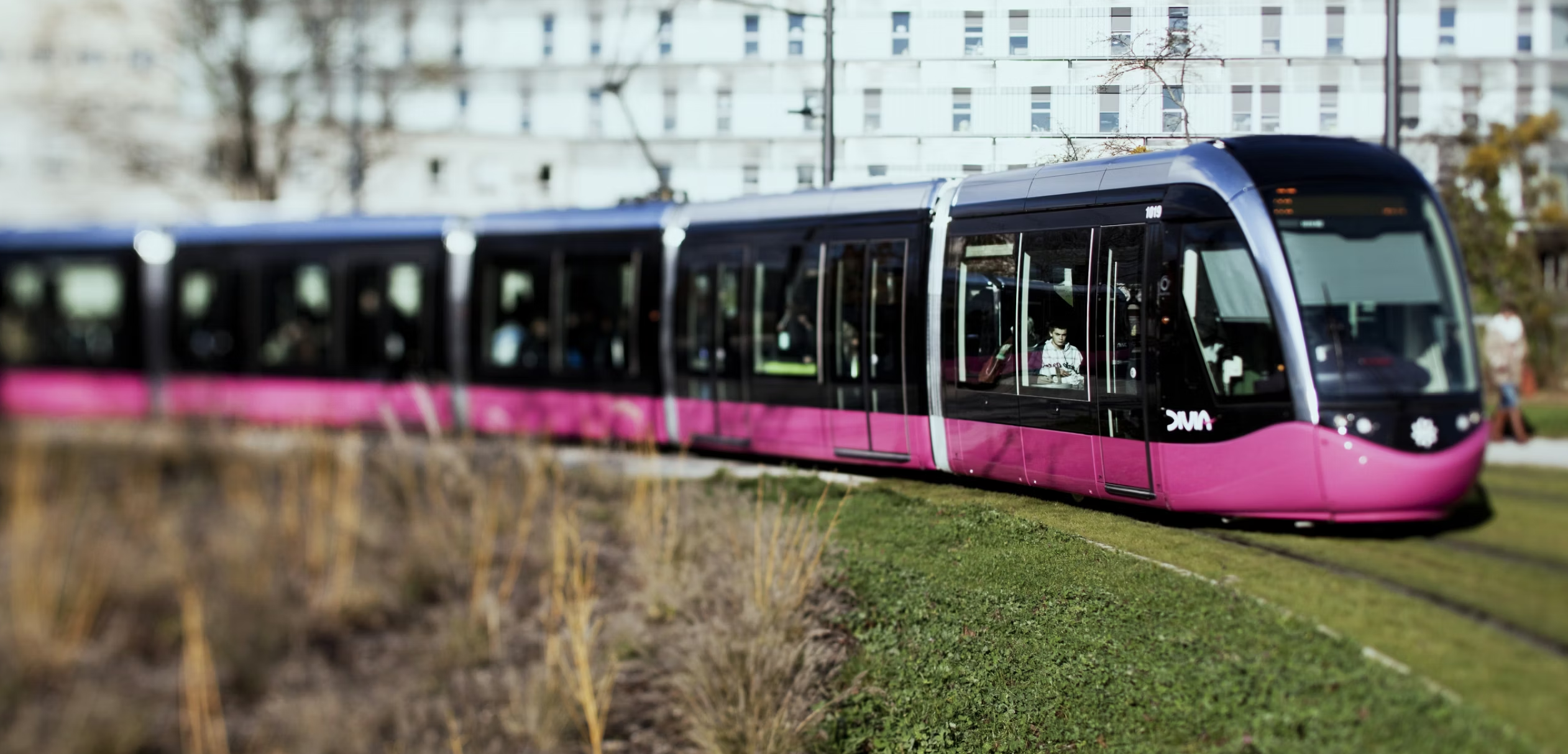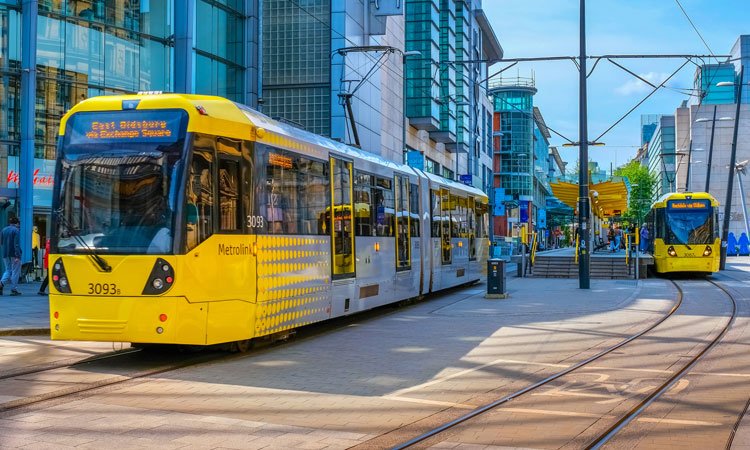
Today Keolis began operating and maintaining Dubai’s driverless metro network and operating the emirate’s tram network under a 15-year contract awarded by the Roads & Transport Authority (RTA) on 31 January 2021.
- Keolis-MHI (1) is a joint venture led by Keolis that includes Mitsubishi Heavy Industries Engineering (MHI) and Mitsubishi Corporation (MC) which have both been heavily involved in the construction and development of Dubai’s metro network since 2005. For this contract, Keolis-MHI has recruited 1,850 employees, mainly from the previous operator, following a smooth seven-month transition period.
- To celebrate the handover, an official ceremony was held at Al Rashidya metro depot in Dubai, in the presence of His Excellency Mattar Mohammed Al Tayer, Director-General, Chairman of the Board of Executive Directors, Roads & Transport Authority; Bernard Tabary, International CEO, Keolis Group; Kentaro Hosomi, Chief Regional Officer for Europe, Middle-East and Africa of Mitsubishi Heavy Industries; and Wallace Weatherill, Managing Director of Keolis-MHI.
- Keolis has been a leader in automated metros for 40 years and operates and maintains some of the world’s most iconic systems, including London’s Docklands Light Railway, Lille, the world’s first driverless metro, Lyon and Rennes (France), Doha (Qatar), Shanghai (China) and Hyderabad (India). The Group also operates a variety of tram networks including the world’s largest in Melbourne (Australia), the UK’s largest in Manchester, and Bordeaux (France).
His Excellency Mattar Mohammed Al Tayer, Director-General, Chairman of the Board of Executive Directors, Roads & Transport Authority (RTA) said: “Dubai Metro currently constitutes the backbone of transportation systems in Dubai. It links vital areas and provides safe and smooth mobility for riders. The huge successes of the Dubai Metro have gone far and wide beyond the scope of the Emirate. The metro has embellished the global profile of Dubai as a superior business hub and a key destination for an exceptional quality of life. The metro is a brilliant addition to Dubai’s iconic landmarks as it uses state-of-the-art rail technology”.
Keolis Group CEO Marie-Ange Debon said: “We are very excited to begin operating Dubai’s world-class metro and tram networks in collaboration with MHI and MC. We’re also delighted to welcome 1,850 new members of staff to Keolis Group. Our shared goals bring us together: meeting the highest safety standards, delivering outstanding passenger service, and moving together towards a smart and sustainable future. Along the way, we’ll continue to focus on safety, quality, innovation and sustainability. Our ultimate goal is to ensure customer happiness by providing the very best passenger experience to Dubai’s residents and visitors. We share RTA’s Smart City Vision, which sees smart mobility as the answer to a more efficient transport system and a more vibrant city. And we look forward to accompanying RTA on this exciting journey to make the city safer, cleaner and more attractive.”
A smooth transition for a successful operation
The transition of assets and systems went smoothly, in line with RTA’s requirements, which called for retaining a majority of Serco’s workforce who have acquired extensive experience in operating and maintaining Dubai’s metro and tram networks.
To facilitate the move, Keolis sent in a transition team whose members reflect the Group’s expertise in France and around the world. It included 52 staff dedicated to mobilisation on the ground, alongside 105 experts in operations, maintenance, human resources, marketing and customer relations.
Setting stringent standards and defining clear areas of responsibility, the new contract spans 15 years composed of a nine-year fixed term contract with three possible two-year extensions.
Keolis-MHI is responsible for operating and maintaining the Dubai Metro Red and Green lines and operating the Dubai Tram. The company will run all metro and tram network assets, from trains and control centres to stations and associated infrastructure, delivering premium passenger transport services capable of handling large variations in passenger numbers.
Also covered are operation and maintenance of the automated metro and fare systems, and full coordination and integration of Dubai’s metro, tram and other means of transport. The service must meet the highest standards of security and safety for passengers as well as demanding performance indicators for operations and punctuality.
Dubai Metro, the backbone of Dubai public transport
As the world’s longest driverless metro, Dubai Metro uses level-4 communications-based train control (CBTC) technology by Thales, which boosts transport capacity by reducing the interval between trains.
The system has two lines (including Route 2020) covering a total of 90 kilometres, including 15.8 km of tunnel. Its 53 fully air-conditioned stations offer a host of facilities, from retail outlets to Wi-Fi. The metro system is also part of a wider, multimodal network that expands travel options by linking metro stations with bus, taxi and marine services.
Safe and convenient mobility has helped boost the global competitiveness of Dubai, as it prepares for Expo 2020 Dubai, which opens in October 2021.
The metro has also reduced carbon emissions and eased traffic congestion by 15% down to 25% in the districts it serves. Along the way, it has helped raise the use of public transport threefold, from 6% of the population in 2006 rising to 18.1% in 2019.
The network operates with 129 metro trainsets — 79 Kinki Sharyo metro trains delivered by Mitsubishi in 2009 and 50 Metropolis trains built by Alstom — and provides easy access to key locations, including Dubai International Airport, Burj Khalifa, Dubai Healthcare City and the Expo 2020 site, where the United Arab Emirates is set to host a highly-anticipated World Expo for six months from October 2021.
Dubai Tram – a technological gem that blends seamlessly into the cityscapeThe city’s catenary-free tram network, which opened in 2014, uses an APS ground-level power supply system to offer passengers convenient, comfortable travel. Since there are no wires overhead, it also provides great views of Dubai’s magnificent urban landscape.
The network totals 10.6 km, serving 11 stations with 11 Alstom Citadis trams, and connects to two metro stations: Dubai Marina and Jumeirah Lake Towers.
Partnering with public transport authorities to enhance metro and tram operations in cities around the world

In Dubai, Keolis will draw on its extensive international experience of operating and maintaining automated metros and trams in close partnership with public transport authorities (PTAs). It currently works with some 300 around the world the world, including:
- UK: Transport for London and Transport for Greater Manchester
- Australia: Department of Transport (Victoria), Transport for New South Wales (NSW), Department of Transport and Main Roads (Queensland), Department for Infrastructure and Transport (SA)
- France: Sytral (Lyon), Bordeaux Metropole (which first deployed the APS tram), MEL in Lille (home of the world’s first automated metro), and Rennes Metropole
- India: Larsen & Toubro, Hyderabad
- China: Shentong Metro Group (Shanghai)
- Qatar Rail.
Dubai metro and tram networks – key figures
Metro network:
- 90km
- 2 lines
- 53 stations
- 79 Kinki Sharyo metro trainsets + 50 Alstom Metropolis trainsets
- CBTC level 4 supplied by Thales
- 3 depots
- 1 control center
Tram network:
- 10.6 km
- 11 stations
- 11 APS Citadis trams
About Keolis
Keolis is a pioneer in developing public transport systems and works alongside public authorities who want to enhance shared mobility systems to grow the appeal and vitality of their regions. A world leader in operating automated metro and tramway systems, Keolis and its partners and subsidiaries Kisio, EFFIA, Keolis Santé and Cykleo support the core business with innovations offering new and bespoke shared mobility solutions for modes including trains, buses and coaches, trolleybuses, shared car solutions, river and sea shuttle services, bike share services, car sharing, fully electric driverless shuttles and urban cable cars. In France, Keolis is the second largest provider of parking management solutions through its subsidiary EFFIA, and the country’s leader in medical transport since the creation of Keolis Santé in July 2017. The Group is 70%-owned by SNCF and 30%-owned by the Caisse de Dépôt et Placement du Québec (Quebec Deposit and Investment Fund) and employs 68,500 people in 15 countries. In 2020, it posted revenue of €6.1 billion. In 2019, 3.4 billion passengers used one of Keolis’ shared mobility services. www.keolis.com
* Australia, Belgium, Canada, China, Denmark, France, Germany, India, Luxembourg, the Netherlands, Norway, Qatar, Senegal, Sweden, the United Kingdom and the United States.
About Mitsubishi Heavy Industries Group
Mitsubishi Heavy Industries (MHI) Group is one of the world’s leading industrial groups, spanning energy, logistics & infrastructure, industrial machinery, aerospace and defense. MHI Group combines cutting-edge technology with deep experience to deliver innovative, integrated solutions that help to realize a carbon neutral world, improve the quality of life and ensure a safer world. For more information, please visit www.mhi.com or follow our insights and stories on www.spectra.mhi.com.
About Mitsubishi Corporation
Mitsubishi Corporation is a global integrated business enterprise that develops and operates businesses together with its offices and subsidiaries in approximately 90 countries and regions worldwide. Its global network comprises some 1,700 group companies that are overseen by 10 Business Groups engaged in virtually every industry: Natural Gas, Industrial Materials, Petroleum & Chemicals Solutions, Mineral Resources, Industrial Infrastructure, Automotive & Mobility, Food Industry, Consumer Industry, Power Solution and Urban Development. Since its establishment, MC has worked in collaboration with its trusted global partners to expand its activities far beyond its traditional trading operations. Today those operations include upstream-to-downstream investments, project developments, production and manufacturing. For more information on MC, please visit the company’s website at https://www.mitsubishicorp.com/jp/en/
(1) Keolis-MHI: Keolis 70%, Mitsubishi Heavy Industries Engineering (MHI) 25%, Mitsubishi Corporation (MC) 5%
More News


Keolis Hosts First Tramway Club in Manchester

UK Transport Minister inspired by Keolis Dijon
